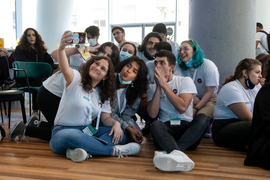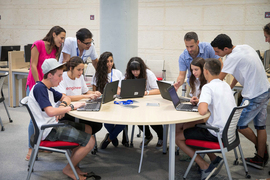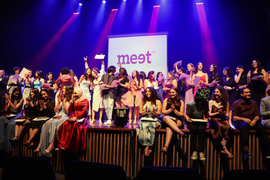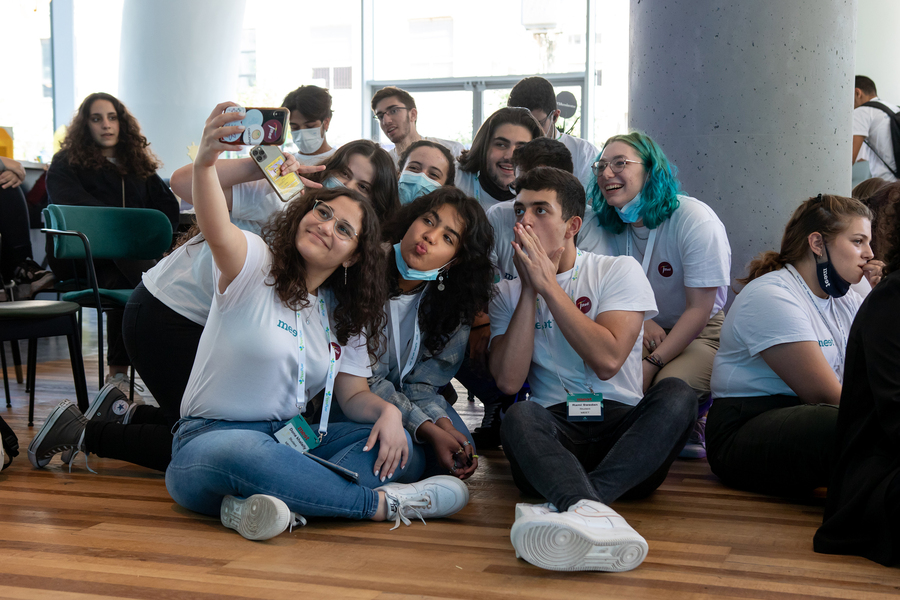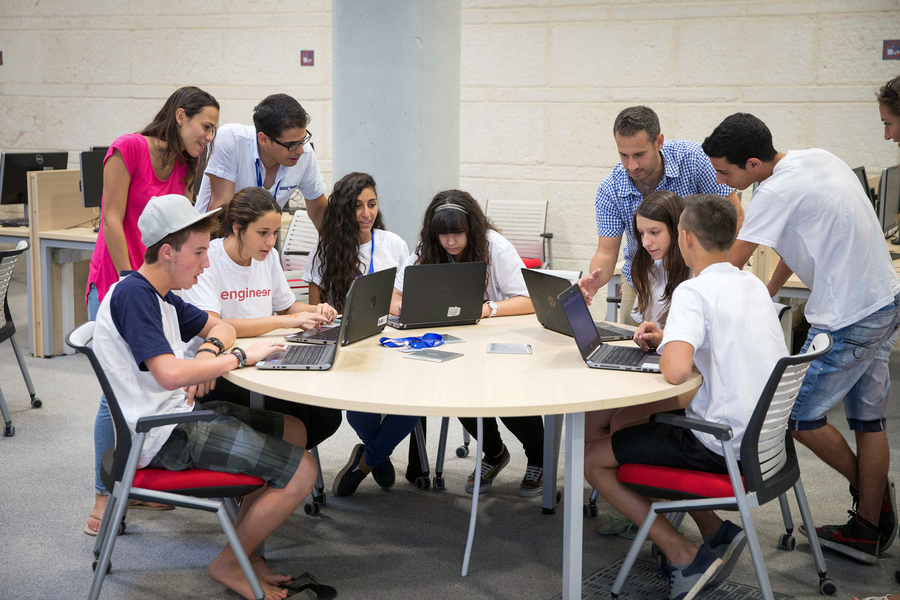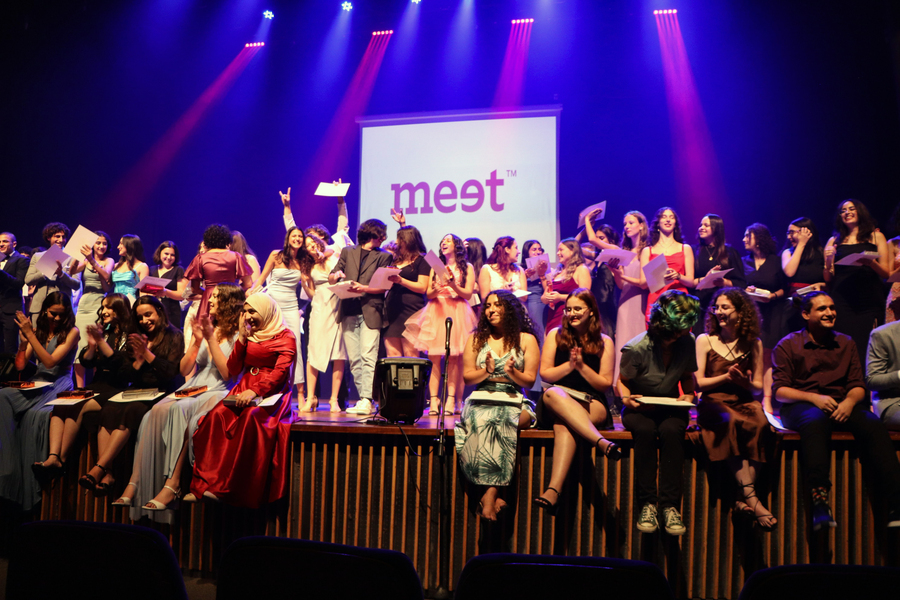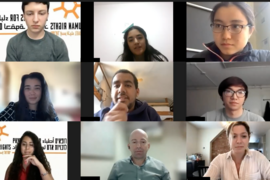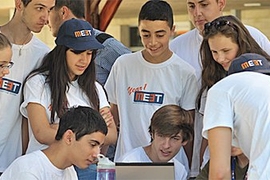Growing up as a shy kid in Palestine, Joseph Michael didn’t have much exposure to computer science. As a result, he couldn’t see how it applied to his life. But in 2018, at the age of 14, Michael joined the Middle East Entrepreneurs of Tomorrow (MEET), a three-year, Jerusalem-based program that brings together promising young Palestinian and Jewish Israeli students to learn about computer science, entrepreneurship, and leadership. MEET’s mission is to empower students to positively impact the Middle East by showing them the value of collaboration as they go through a fast-paced curriculum.
Over the next three summers, Michael was part of a MEET team that aimed to teach disadvantaged youth how to fix outdated and broken computers. The children, many of whom were like Michael and lacked access to technology, learned to see the machines as highly useful tools that could be broken down into component parts. In the end, they walked away with their very own computers.
The experience helped Michael discover a passion for expanding computer literacy. Through it, he built lifelong friendships with people from different backgrounds. Today, Michael works as an instructor and mentor teaching students as young as 7 about coding and entrepreneurship.
Michael’s story epitomizes the vision MEET’s founders laid out when they started the program as students at MIT. Back in 2004, in response to another spate of violence between Jewish Israelis and Palestinians, siblings Anat Binur PhD ’11 and Yaron Binur ’05 wanted to broaden Middle Eastern youth’s perspectives while equipping them with the skills to make an impact in the region.
The founders’ own transformations since coming to MIT shaped their approach.
“We saw the big role that networks played in our lives,” Anat says. “The people you know change the way you look at the world, how you define a problem, and the resources you have to solve those problems. At MIT, we were interacting with people we would’ve never had a chance to meet otherwise, and we saw how they were redefining the way we looked at the world and opening up new opportunities. Most Palestinians and Israeli Jews never have a chance to meet each other. If they do meet, it’s in the worst of circumstances. Therefore they aren’t in each other’s lives, and they see the problems in one dimensional ways.”
That insight has blossomed into an impactful program over the last 19 years. Today more than 800 students have gone through the MEET program, which is taught by a cohort of MIT student instructors and local professionals each summer. Although most MEET alumni are still under 30, they have gone on to spearhead conflict resolution and advocacy work, found successful social and technology startups, contribute to cancer research, and break down barriers in the investment community. Thirty MEET alumni have been accepted to Technion, the Israel Institute of Technology; 13 have been accepted to MIT; and another two have been accepted to Harvard University.
But the most important output of MEET is harder to quantify. It involves broadening student perspectives by exposing them to people and experiences that they say have changed the course of their lives.
“The idea is to create a future network of leaders that would understand the advantages of working together and stay in each other’s networks, so they can have huge impact on the economy, politics, and social organizations in a positive way in both communities,” Anat says.
A program with a purpose
Yaron was an undergraduate and Anat was about to start her PhD at MIT when violence in their home country of Israel compelled them to start a program to promote change in the region. They started a student group at MIT and began recruiting classmates to travel to Jerusalem that summer to start the MEET program, raising money as they went.
After a few years, MIT International Science and Technology Initiatives (MISTI) began organizing the MIT student portion of the program by recruiting, training, and supporting student travel to Israel each year. The MIT Computer Science and Artificial Intelligence Laboratory (CSAIL) also provided support.
As the MEET program grew, so did its reputation. Today it regularly gets about 1,500 applicants for each new cohort. Every year it selects 120 new students, split evenly between Palestinians and Jewish Israelis, and between boys and girls.
After the first two summers, students continue working together in an afterschool program that takes place both in person and virtually. They learn how to code and start a business — what the founders describe as a “mini MBA” — along with soft skills like teamwork, leadership, and empathy. The last two summers are more advanced, with students splitting into startup teams and building solutions to problems in their communities.
“It’s intense and in-depth, and that’s intentional,” Yaron says. “We feel in order for them to form long lasting relationships and understanding, it has to be something more than a couple of days or weeks. We also feel giving them these unique skills puts them in a position to succeed in the future.”
Many students stay involved with MEET after they graduate. Some continue their startup projects and go on to raise private funding for their ventures. The MEET network also continues providing mentorship and support for students as they continue their academic and professional careers.
MIT student instructors — including undergraduates and graduates from every school at MIT — also often stay involved after their summer in Jerusalem. This summer, former instructor Ted Golfinopoulos SM ’09, PhD ’14 flew to Jerusalem for a single day to experience the MEET student graduation. It was his 16th time attending the ceremony.
Junior Jocelyn Zhu served as an instructor last summer and returned this summer to see her former students.
“I don’t think you can get that experience anywhere else,” says Zhu, who currently serves as a MISTI-MEET liaison. “The month you’re there, your entire life is about the students and learning how to communicate across boundaries, which I think is super relevant not only there, but also in the U.S. in terms of handling political polarization. I found it to be very impactful.”
Leaders and changemakers
Shayma Sharif graduated from the MEET program in 2008. The experience was so meaningful for her that she later served as a MEET instructor and currently sits on MEET’s board. In 2019, she became one of the few female Palestinian venture capitalists in the Middle East when she joined the prominent Silicon Valley-based investment firm NFX. The following year she landed on Forbes Israel’s 30 under 30 list, and she continues to serve as a role model and mentor for female students interested in technology and entrepreneurship.
As MEET’s alumni base grows, the founders want to leverage that network more intentionally to expand the program’s impact. In collaboration with MISTI, MEET will be launching a new leadership program for both alumni of MEET and MISTI programs in the Middle East.
“I think this is an important time to accelerate and keep pushing forward,” Yaron says.
The founders are humbled by the impact of MEET so far, but say it has not yet achieved its ultimate mission of bringing peace to the Middle East.
Still, there are moments when the program’s progress sinks in for the founders. For Anat, one of those moments came this summer, as she stepped into the auditorium where 300 students gathered for graduation.
“There were about 600 Jewish Israeli and Palestinian family members in there,” Anat recalls. “That is really rare. Palestinians and Israeli Jews don’t sit in the same auditorium, or meet up, or share a program with their children. I started thinking back to 2004, when we started with 30 students. Now we have these kids who have spent three intense years together, learning, working, and recognizing each other’s capabilities in ways that go way beyond their nationality.”
